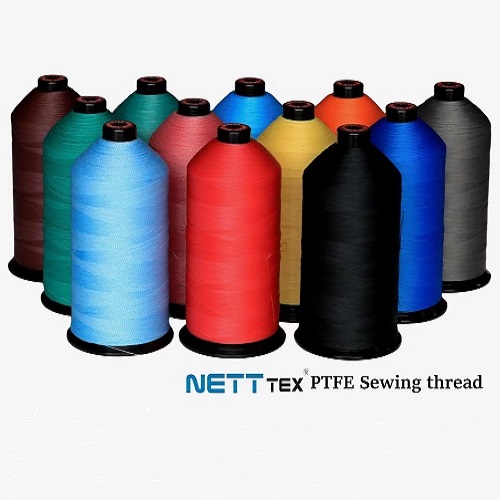What Makes PTFE Sewing Thread a Game-Changer in Industrial Sewing?
2025-01-08
In the world of industrial sewing, choosing the right materials can make all the difference. Whether you're stitching heavy-duty fabrics, creating garments, or working with specialized applications, the thread you use plays a significant role in the final outcome. One thread that has gained considerable attention in recent years is PTFE sewing thread. But what exactly is PTFE sewing thread, and why is it becoming a go-to choice for many industries?
What is PTFE Sewing Thread?
PTFE (Polytetrafluoroethylene) is a synthetic polymer best known by the brand name Teflon. It is often used in non-stick coatings, but it also has a wide array of applications in various industries, including the textile and sewing industries. PTFE sewing thread is made from this durable material, which gives it a unique set of characteristics that traditional threads simply cannot match.
Unlike regular cotton or polyester threads, PTFE sewing threads are highly resistant to heat, chemicals, and abrasion. This makes them particularly useful for industries where durability, resistance, and longevity are paramount. From high-performance workwear to specialized applications like marine upholstery and automotive textiles, PTFE sewing threads have earned a reputation for reliability.
Why Choose PTFE Sewing Thread?
1. Superior Durability and Strength
One of the most significant advantages of PTFE sewing thread is its exceptional durability. Unlike cotton or polyester threads, PTFE threads are highly resistant to wear and tear. They can handle harsh conditions such as high temperatures, exposure to UV rays, and the constant friction that comes with repeated use. Whether used on outdoor gear or heavy-duty industrial fabrics, PTFE sewing thread provides strength and resilience, ensuring that the stitches stay intact even under challenging conditions.
2. Heat and Fire Resistance
PTFE is known for its high melting point and ability to withstand extreme temperatures. This makes PTFE sewing thread the ideal choice for applications that involve heat exposure, such as automotive, aerospace, or fire-resistant garments. For example, in the automotive industry, PTFE thread can be used in seat covers, airbags, and other heat-sensitive components without worrying about the thread melting or degrading.
3. Chemical Resistance
Another standout feature of PTFE sewing thread is its resistance to chemicals and solvents. This makes it highly useful for industries that deal with corrosive substances, such as chemical processing, pharmaceuticals, or food packaging. The thread will not break down or lose its strength when exposed to harsh chemicals, ensuring long-lasting performance in even the most challenging environments.
4. Low Friction and Non-Stick Properties
Thanks to its low friction characteristics, PTFE sewing thread offers smooth stitching and prevents the thread from tangling or breaking during the sewing process. This is especially important for automated or high-speed industrial sewing machines, where efficiency and speed are key. Additionally, its non-stick nature makes PTFE thread ideal for sewing difficult materials such as PVC, leather, or other sticky fabrics that may cause issues with conventional threads.
5. Water and Weather Resistance
PTFE threads are highly resistant to water and weather elements. This makes them a popular choice for outdoor gear, such as tents, backpacks, and outdoor clothing. Whether it's rain, snow, or humidity, PTFE thread will not degrade or lose strength when exposed to moisture, ensuring that the stitches remain intact and the items stay durable over time.
6. Environmental Benefits
Although PTFE is a synthetic material, it is non-toxic and has a minimal impact on the environment once disposed of properly. Additionally, PTFE sewing thread's longevity means that products sewn with it will require fewer repairs or replacements, ultimately contributing to waste reduction.
Applications of PTFE Sewing Thread
Given its impressive range of features, PTFE sewing thread has many applications across various industries:
1. Automotive Industry: PTFE thread is often used for stitching seat covers, airbags, and other components that need to withstand high heat and wear. Its strength and resistance to chemicals also make it ideal for manufacturing fuel and brake lines.
2. Aerospace: In the aerospace industry, PTFE threads are used in aircraft seats, cushions, and other fabric components that require durability, fire resistance, and strength.
3. Marine Upholstery: The marine environment presents unique challenges, such as exposure to saltwater, UV rays, and constant friction. PTFE sewing thread is ideal for marine upholstery applications, such as boat covers and cushions, as it offers resistance to mildew, rot, and fading.
4. Workwear and Protective Clothing: PTFE thread is commonly used in the production of fire-resistant workwear, protective gloves, and other safety gear. It ensures that the garments remain intact even when exposed to high temperatures, chemicals, or abrasive conditions.
5. Outdoor Equipment: From tents to backpacks and sleeping bags, outdoor gear needs to endure exposure to the elements. PTFE sewing thread's waterproof, weather-resistant, and durable properties make it the go-to choice for stitching high-performance outdoor products.
6. Medical and Filtration Applications: PTFE thread is also used in medical applications, such as surgical sutures, due to its biocompatibility and resistance to bodily fluids. It is also commonly used in filtration systems for its chemical and heat resistance.
Conclusion: The Future of Sewing Threads in Demanding Industries
PTFE sewing thread represents a major advancement in materials used for industrial sewing. With its superior strength, heat resistance, and versatility, it has become a go-to choice for industries that demand high-performance, durability, and reliability. Whether you're working in automotive, aerospace, marine, or outdoor equipment, PTFE sewing thread ensures that your seams stay intact under even the harshest conditions.
As technology and innovation continue to evolve, the demand for specialized threads like PTFE will likely grow. With its ability to meet the needs of industries requiring high-performance, durable stitching, PTFE sewing thread is poised to remain a game-changer in the world of industrial sewing for years to come.



